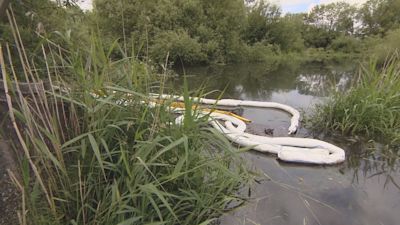Calls for urgent clean-up after oil and diesel leaks into Hampshire river

Video report by ITV News Meridian's Rachel Hepworth
Images of dead fish and cygnets have prompted calls for an urgent clean-up along the River Test in Nursling, after significant amounts of oil and diesel leaked into the water during heavy rain.
Environmentalists say more must be done to fix the drainage infrastructure, along what is meant to be a highly protected nature reserve.
Howard Taylor shows ITV Meridian the state of the water along the lower reaches of the River Test; a Site of Special Scientific Interest and world famous for its fly fishing.
He says: "We have people coming from all over the world to fish here, and having events like this, stopping those fish migrating upstream to spawn - you know they will not run through a curtain of toxic goo."
Booms put in by the water company have done little to stem the flow.
As this stretch of water is tidal, the chemicals are washed downstream and back up again, concentrating the pollution.
But while the leaks may be accidental, Howard says he's been reporting similar incidents for a decade and believes this interceptor, designed to prevent exactly this type of contamination, isn't working. He believes Southern Water 'must do more'.
Howard says: "The Government needs to wake up and listen to people like us who are guardians of these rivers, and they need to give their enforcement organisations like the Environment Agency the teeth to deal with serial polluters."The Environment Agency says they are 'considering their enforcement response'.
Meanwhile Howard says his fly fishing business is losing hundreds of pounds a day, and the long term cost to the environment is yet to be assessed.
In a statement Southern Water said: "We are working in partnership with the Environment Agency on an oil pollution affecting the River Test.
"On 15th June 2021 the Environment Agency received a report from environmental consultants working for a company on the estate that oil had been found in their groundwater monitoring wells and was found to be entering the surface water drainage system especially during heavy rainfall events.
"We will continue to fully support the EA in their attempts to minimise the risk of further pollutions from the Industrial Estate to both the watercourse and groundwater in the area, and we will support them in any enforcement action they may take against the polluter.
"We recognise the location is a sensitive and internationally important natural habitat and whilst primary responsibility for any further clean-up or remediation lies with the polluter, we are working closely with Natural England on how to help with the clean-up. We have installed additional preventative booms as part of the clean-up operation.
"Fortunately, no evidence of distressed wildlife has yet been found in the area, but we continue to investigate these claims."